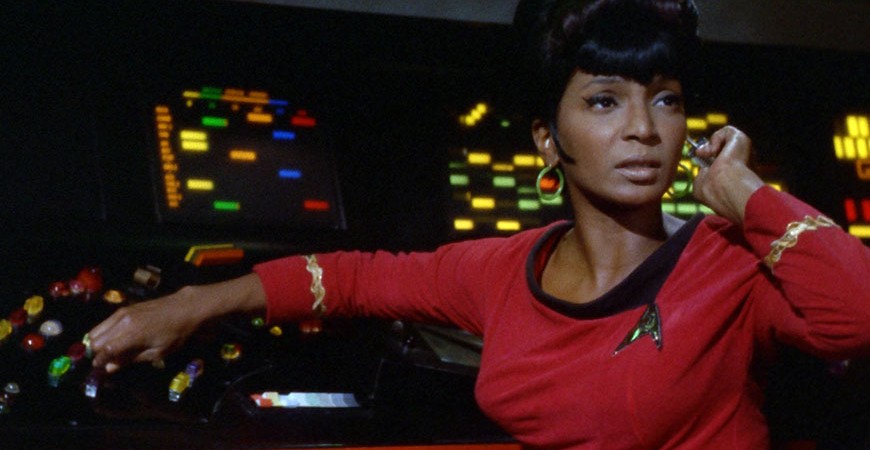I am truly humbled, honored, and excited to publish this new interview with Star Trek’s Nichelle Nichols. The character of Lieutenant Uhura has served as an inspiration to millions of people of both genders and extremely diverse backgrounds around the world since her television debut in 1966.
This is the second time we’ve talked — the first was a few years back, after the Pan African Film & Arts Festival in Hollywood. I was a representing NASA in a panel discussion about blacks in science–fiction films. Nichelle and I immediately hit it off and talked for several hours afterwards.
We subsequently worked together on a nationally-touring planetarium show called The Stargazer. During our time together, she told me so many amazing stories — I wanted to share them with my FutureDude readers.
I hope you enjoy reading this interview as much I did conducting it. There were moments where greater truths came into focus, and I was truly moved to tears.
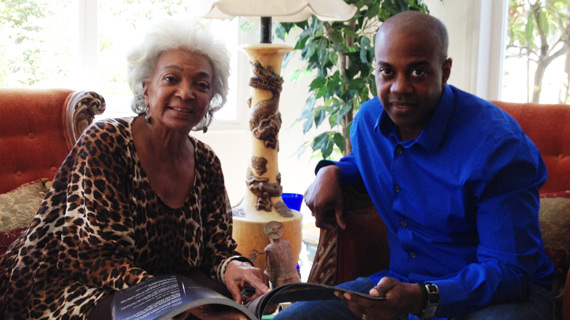
At the home of Nichelle Nichols…
FutureDude: As a child did you ever imagine the future?
Nichelle Nichols: Actually, I did. I also thought about the possibility of traveling in space and exploring other worlds. I remember asking my father if there was life in the Universe or on other planets.
He said, “Let’s think about that. Do you really think that in a universe as vast as this one that God would only create one planet with intelligent life.” (laughs) Well, ‘so–called’ intelligent life? I would think about that a lot. I eventually imagined that there had to little girl out there that looks like me and talks like me.
So, she was out there in the stars?
She was out there in the stars. My ruling astrological planet is Saturn. I said that she was from Saturn. I named her Saturna, and I eventually wrote two books about her. Saturn’s Child. So, I grew up with an imagination, and if there was a creator who created me — I could create her.
Uhura also grew out of my imagination. When Gene Roddenberry called me in to offer me the role, it was an unnamed character. It was simply the communications office and fourth in command. It had started out with his second pilot for the show, “Where No Man Has Gone Before”, and the character was a man.
I remember that. It was an African-American man. I don’t remember him saying too much.
Right. That actor, Lloyd Haynes, left and went to join the show Room 222. Anyway, Gene had always wanted a woman on the bridge. So, for what became the first on-air episode, “The Man Trap”, they went in a different direction. Gene had given me my first guest star role three years prior to Star Trek on the show The Lieutenant with 2001’s Gary Lockwood.
So they ended up hiring me. When I came onboard, the writers went gaga! They were writing a strong role for me.
I would assume your casting really challenged the status quo.
Absolutely! There were complaints from the front office. The studio was like, “There’s a woman on the ship!” (laughs)
They already had the Asian and the guy with the pointed ears, then here was me: a strong character that continued to grow stronger with each passing show. She was strong, confident, and well–written. The studio nearly lost their minds and there would be re-writes. So Gene would work with the directors on set and so — in spite of my script being cut — it would be remolded in production.
It was almost like the more they tampered, the stronger you became. I love that.
Right. And the stronger the role became, the studio forgot about cutting my lines.
I’ve heard that you planned on leaving Star Trek after the first season?
Well, my background was in musical theater: Broadway shows. This was just a pleasant diversion for me. So it didn’t really bother me that the role wasn’t really big, because I was going to leave anyway. And now that I was on TV for a season, I was getting a lot of attention. So, I was on my way.
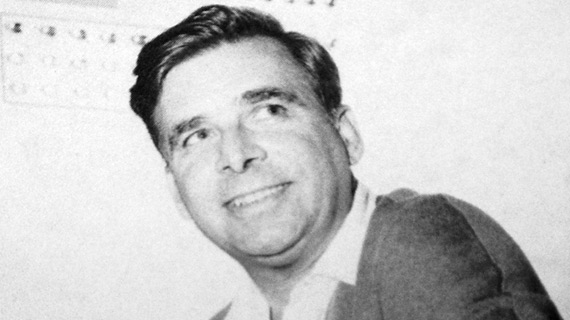
I went in to tell Gene Roddenberry that I was leaving the show and he looked up at me startled. I thanked him for the opportunity and so forth. He was speechless. But there was this feeling that they were going to cancel the show anyway, so I figured why not leave on a high note.
He looked at me and said, “You can’t do that. Don’t you realize what I am trying to achieve here. It’s more than just a role.”
That was on a Friday night. And he said, “I know how you are feeling. You have a lot of talent. You’re a great singer, actor and so forth. But please take the weekend and think about it. Let’s talk about it again on Monday.” He accepted my letter of resignation and put it in his top drawer.
Over the weekend, I attended an NAACP event in Beverly Hills. Just as I sat down at the dais, one of the promoters running the event came up to me and said someone wanted to meet me — a person who was my biggest fan. I said, oh, certainly. I turned around and there was Dr. Martin Luther King, Jr. beaming at me! I was speechless. I could not speak.
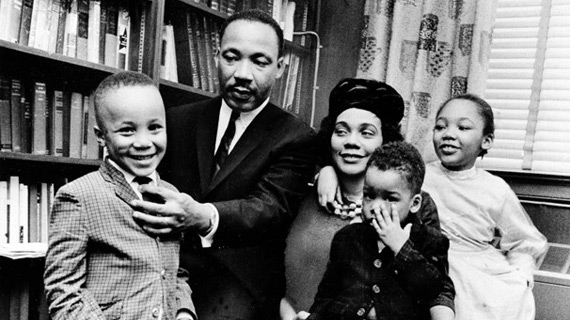
He told me that he was my biggest fan and that I was so important to what he was doing with the overall cause. I was stunned. Because every night, when I was finished shooting, I would see the struggle on television. People having fire hoses and dogs turned on them. Being told that they weren’t good enough to eat lunch at a counter, much less be treated as a human being. This was the man who enflamed all of the hearts and who kept people going.
Right.
Who as, far as I was concerned, was my leader. And here he was telling me these wonderful things about my appearance on television. About how important what I was doing, and how pleased he was with me creating a strong character. He said you have a strong, quiet dignity.
Again, cutting your lines had the opposite effect.
Exactly. So I thanked him and said, “I wish I could be out there with you.” And he told me that I was far more important where I was, because when people looked at me I was where everyone should be. It could not be denied. And there I was representing everyone in the 23rd Century. So, he was saying that what they were marching for was there on the screen.
You were showing the outcome. The solution.
I thanked him but I told him that I was leaving the show, and before I could even mention Broadway, he said, “You cannot do that!” I was stunned. He then talked about the reality that Gene had created and how I was part of that. He also said, “Besides, you’re fourth in command, you can’t go. You cannot abdicate!”
I have to admit, I’m blown away by how much Dr. King knew about the show!
He added, “Besides, Star Trek is the only show Coretta and I will allow our children to stay up and watch!” (laughs)
I went home and it was all I could think about the entire weekend. I went back on Monday morning. I went back to Gene’s office and I really didn’t know what I was going to say. The instinct to further my career was strong. But I opened my mouth and I told him what Dr. King had said. I told him that if he wanted me to stay, I would.
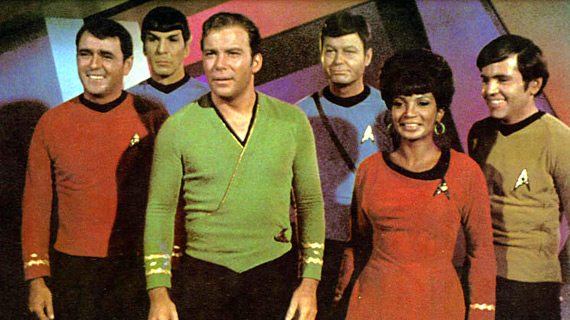
Gene was a big man. Six foot three. He looked it me, and a tear rolled down his face. He said “God bless Dr. Martin Luther King. Somebody understands what I am trying to do here.” And he pulled his desk drawer open and pulled out my letter of resignation and handed it back to me. It had been torn into a thousand pieces. He then said, “Welcome home.”
It was amazing to see everything converge like that, and it told me that my life and career, from that moment on, were about something greater.
I have to tell you, as someone who grew up watching Star Trek — I saw it in reruns as a child — I was deeply affected by your presence and your portrayal. I spent my early years in Arizona. My father was one of the first African-American engineers in that state. He was a trailblazer who faced a ton of racism.
He and my mother moved us to the suburbs of Phoenix to a good neighborhood because they wanted my sister and I to get a strong education at a magnet school. As a result, we were virtually the only kids of color in a white, middle-class school. We faced our daily share of racism as well.
That sounds awful, but it sounds like you have a great family.
I really do. I didn’t realize until a few years ago when someone asked me why I was so into science fiction and the future. I told him I wasn’t sure. But after considering the question, I realized that, to me, the past represented adversity whereas the future represented possibilities.
Yes, that’s it.
Whatever conflicts I faced at school every day, I knew that I would be able to come home and watch Star Trek. And I will tell you that, as a small child, I got it. Seeing you there was an enormous inspiration and example that the future was eventually going to turn out all right.
As Gene said… “God bless Dr. King.”
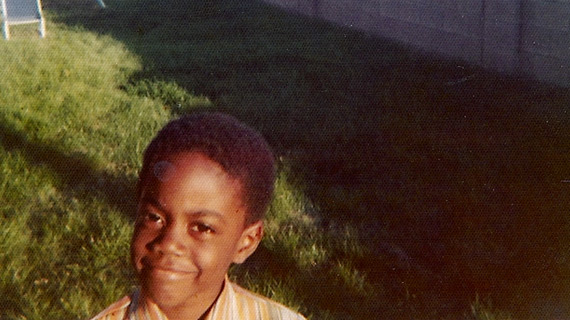
Part 2… Coming Soon
There were many dimensions to the Civil Rights struggle. In asking Nichelle to remain on Star Trek, Dr. King understood that a just society is created not only by direct action on the streets, but also by nurturing artistic visions of a better tomorrow. His greatest hope was that Lt. Uhura inspire the entire world.
As you read above, in my case, it happened exactly as Dr. King and Gene Roddenberry hoped. But it also was true for countless people in my generation, none more famous than Dr. Mae Jemison — the first African-American woman in space. Her role model, as a young child, was Nichelle’s TV character; Lt. Uhura was a space explorer, and Mae was determined to be as well.
Images: DODLive, TrekCore, WashingtonPost, SherylFranklin, and FutureDude.
